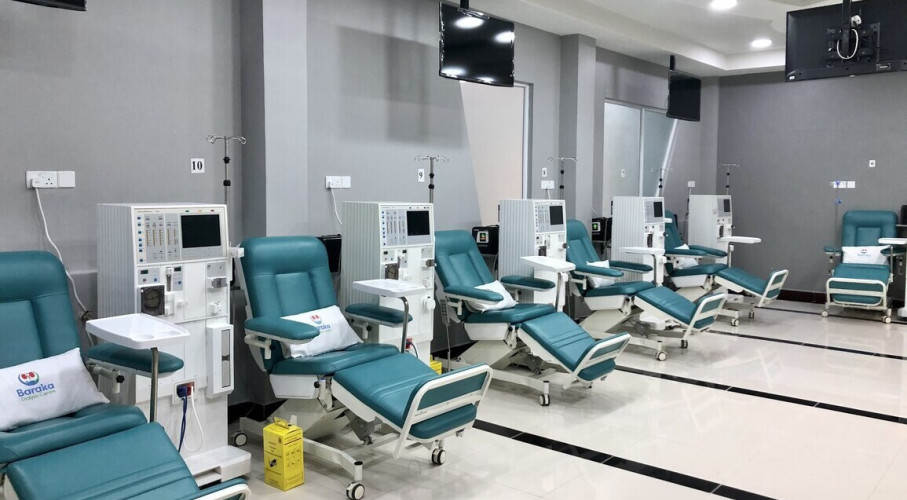The rising prevalence of kidney disease in Nigeria and across sub-Saharan Africa underscores the urgent need for accessible, high-quality renal care services. With the steady increase in non-communicable diseases such as diabetes and hypertension, two major contributors to chronic kidney disease (CKD) the demand for dialysis is rapidly exceeding the capacity of the existing healthcare infrastructure. For thousands of individuals living with end-stage renal disease (ESRD), routine dialysis is essential for survival. However, limited access, high treatment costs, and long travel distances continue to create significant barriers to care. The establishment of dedicated dialysis centres is no longer optional, it is a life-saving imperative.

A modern dialysis facility provides a controlled, clinical environment where patients with ESRD can receive ongoing treatment with safety, consistency, and dignity. Hemodialysis, the most common therapeutic approach, requires advanced medical equipment and a multidisciplinary team skilled in nephrology, patient care, and infection control. The successful development of a dialysis centre involves comprehensive planning across several areas: infrastructure design, acquisition of specialized technology, recruitment and training of personnel, and adherence to regulatory and quality standards. Essential systems—such as medical-grade water treatment, emergency care readiness, and patient monitoring—must be carefully integrated to ensure optimal outcomes.
The core objective of a dialysis centre is to significantly reduce the mortality and morbidity associated with kidney failure by offering timely and continuous access to treatment. In many regions of Nigeria, patients are compelled to travel long distances or relocate entirely to receive regular dialysis, placing immense financial and emotional strain on families. Strategically located centres, especially in underserved or peri-urban areas can help decentralize renal care, bring services closer to those in need, and ease the burden on major hospitals. By expanding access, these centres not only improve patient outcomes but also help reduce avoidable deaths and complications.
Beyond treatment, a well-established dialysis centre can function as a hub for community education, early detection, and prevention of kidney disease. Integrating public awareness programs, health screenings, and lifestyle counseling can help identify high-risk individuals early and reduce the overall incidence of CKD. Including nephrologists, dietitians, and patient educators as part of the core clinical team ensures a holistic approach to care, focusing not only on managing the disease but also on improving long-term quality of life through behavioral and dietary interventions.
From an economic and systemic standpoint, setting up a dialysis centre contributes significantly to healthcare capacity-building. It creates diverse employment opportunities, from clinical roles to technical and administrative support, and strengthens local health systems through training and knowledge-sharing. Furthermore, dialysis centres can serve as platforms for public-private partnerships, medical research, and collaboration with health insurers and pharmaceutical companies to ensure operational sustainability. Over time, these facilities can evolve to include transplant referral services, telehealth support, or satellite outreach units in more remote areas.
In summary, the development of a dialysis centre is a critical and strategic investment in Nigeria’s healthcare future. It addresses a growing public health crisis, improves patient survival and quality of life, and builds a more resilient and inclusive health system. With thoughtful planning, adequate funding, and a commitment to patient-centered care, dialysis centres have the potential to become transformative pillars of hope, healing, and healthcare innovation for communities across the nation.
By strategically locating dialysis centres in underserved areas, the project will reduce travel time and financial strain for patients, ensuring more Nigerians can receive timely and consistent care close to home
Increased access to dialysis services will significantly lower preventable deaths and reduce the frequency of emergency admissions caused by delayed or missed treatments.
The project will create direct jobs for healthcare professionals, including renal nurses, dialysis technicians, and biomedical engineers. Training programs for nurses and technicians will bridge the skill gap in renal care. Ancillary services (e.g., medical supply vendors, cleaning staff, and security) will also benefit.
Integrated community outreach, screening programs, and education efforts will promote early diagnosis of kidney-related conditions, enabling timely intervention and reducing the number of patients reaching end-stage renal disease.
Our broad objective is to establish an ultra-modern Dialysis centre that provides safe, quality, predictable, and compassionate dialysis treatment. We need to achieve the following objectives:
The proposed number of Dialysis machines to be supplied would depend on the size and scope of the project
The specification of the central water treatment would be based on the proposed number of Dialysis machines
This includes Dialysis consumables as well as kits for measuring Urea, Creatinine, and PVC
Carried out for Renal Nurses, Dialysis Technicians for safe operation and basic maintenance of Dialysis machines
Train staff on equipment use, patient care protocols, and infection control
Establish patient intake systems, electronic records, and workflow processes
Conduct operational tests, including emergency simulations and mock treatments
Engage with local hospitals for patient referrals and community awareness
Initiate soft opening with a limited number of patients
Collect feedback, refine processes, and ensure operational efficiency
Launch full-scale operations with daily dialysis schedules
Begin community outreach and education programs on kidney health and early detection
Engineering National Prosperity